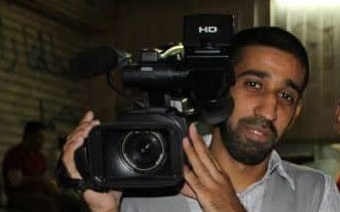Hasan Mohamed Qambar is a 29-year-old Bahraini citizen currently detained in Jau Prison.
Hasan is a photojournalist who documented human rights violations in Bahrain during the 2011 uprising. Authorities arrested him in April 2011 after he covered the first two months of the pro-democracy protests in February and March. He was sentenced to one and a half years in prison by the National Safety Courts, a system of security tribunals that operated during the state of emergency declared by the king. Decisions made by the National Safety Courts were later subjected to civilian review, as a result of the Bahrain Independent Commission of Inquiry (BICI) recommendations. Accordingly, on 23 February 2012, the Appeals Court reduced Hasan’s sentence and released him that same day.
In June 2012, four months after his release, Hasan’s home was raided by agents of the National Security Agency (NSA), Bahrain’s main intelligence body, after he returned to photographic reporting. Since then, Hasan went into hiding. His house was raided more than 60 times during the six intervening years in which he was wanted by the authorities.
Hasan continued to cover the pro-democracy movement despite the government’s harassment, particularly in the Nuwaidrat area, and he suffered serious medical injuries while reporting. For example, during one demonstration a gas container detonated near his head. Security forces have gradually militarized the health system, monitoring and arresting patients that appear to have been wounded by police during protests, and Hasan was forced to seek treatment at informal clinics rather than public hospitals.
On 12 June 2018, the six-year pursuit ended when Hasan was arrested by commando forces, unidentifiable officers in plain clothing, and CID officers following a raid of his home in Nuwaidrat. The authorities accused him of numerous crimes across dozens of cases related to his photojournalism work, and he was ultimately convicted on more than 100 charges.
The following seven sentences, all in absentia, were issued prior to Hasan’s arrest and stem from his coverage of the protest movement: (1) five years of imprisonment for rioting and burning tires in the Nuwaidrat area; (2) five years of imprisonment for burning tires; (3) 10 years of imprisonment for causing damage to an electricity tower; (4) five years of imprisonment for rioting and causing chaos; (5) 15 years of imprisonment for alleged association with a terror organization; (6) five years of imprisonment for rioting and causing chaos in Eker; and (7) 10 years of imprisonment for assault on a police officer in Nuwaidrat.
On 15 May 2018, Hasan was acquitted on the charge of joining the Zulfiqar Brigades, an alleged militant group, in a mass trial of 138 individuals. However, there remains the possibility that the Prosecution will appeal his acquittal on 12 September 2018.
Hasan now faces risk of severe health deterioration in detention at Jau Prison, where authorities routinely abuse inmates and deny them consistent access to medical care. Hasan’s family suffers from the hereditary blood diseases sickle cell anemia, thalassaemia, and favism, and multiple family members have died from these diseases. Hasan has a brother who is currently suffering from these blood diseases and is in very poor condition. It is believed that Hasan suffers from the same hereditary blood conditions and, without the necessary and proper medical treatment, is at risk of severe health problems and death.
Bahrain’s actions against Hasan violate international law, including the International Covenant on Civil and Political Rights (Articles 9 and 14), and the International Covenant on Economic, Social, and Cultural Rights (Article 12). Bahrain is a party to each of these treaties.
ADHRB calls upon Bahrain to uphold its human rights obligations by annulling Hasan’s convictions and ensuring that any subsequent trial is consistent with due process and fair trial rights. We additionally call upon the authorities to provide sufficient medical treatment and medication to Hasan and all others in Bahraini custody.





